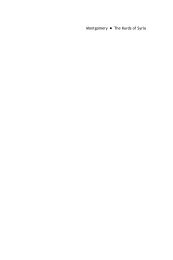Stateless Democracy
1RHiH4Y
1RHiH4Y
Create successful ePaper yourself
Turn your PDF publications into a flip-book with our unique Google optimized e-Paper software.
Professor of Anthropology at the London School of Economics,<br />
activist, and anarchist David Graeber wrote an article for<br />
The Guardian in October 2014, during the first weeks of ISIS<br />
attacks on Kobanê, and asked why the world was ignoring<br />
the revolutionary Syrian Kurds.<br />
Mentioning his father who volunteered to fight in the<br />
International Brigades in defense of the Spanish Republic<br />
in 1937, he asked: “If there is a parallel today to Franco’s<br />
superficially devout, murderous Falangists, who would it be<br />
but ISIS? If there is a parallel to the Mujeres Libres of Spain,<br />
who could it be but the courageous women defending the<br />
barricades in Kobanê? Is the world — and this time most<br />
scandalously of all, the international left — really going to be<br />
complicit in letting history repeat itself?”<br />
According to Graeber, the autonomous region of Rojava,<br />
declared with a social contract in 2011 as three anti-state,<br />
anti-capitalist cantons, was also a remarkable democratic<br />
experiment of this era.<br />
In early December 2014, with a group of eight people,<br />
students, activists, academics from different parts of Europe<br />
and the United States, he spent ten days in Cizîre — one of<br />
the three cantons of Rojava. He had the chance to observe<br />
the practice of democratic autonomy on the spot, and to ask<br />
dozens of questions.<br />
Now he tells his impressions of this trip with bigger questions<br />
and answers why this experiment of the Syrian Kurds<br />
is ignored by the whole world.<br />
196–197



